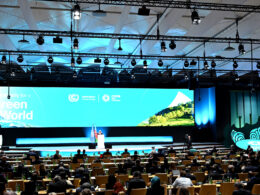Carbon project developers in India are shifting their focus away from renewable energy to generate credits due to the weak demand in the voluntary carbon market (VCM) and concerns over the declining additionality of these projects, according to S&P Global Commodity Insights.
According to market sources cited by S&P interest has moved towards projects in the afforestation/reforestation, cookstoves, REDD+, and biochar segments, which often fetch a premium over renewable energy projects. An India-based developer/trader noted that investors are exploring biochar and other segments due to their higher carbon sequestration potential than renewable energy projects.
Renewable energy projects generate “avoidance-based” credits, that are among the cheapest in the VCM market. Sources highlighted that the additionality of these projects has eroded as renewable energy prices have become more competitive.
S&P quoted an India-based developer saying, “The trend of investors shifting focus from renewable energy to other segments has been noticeable in India over the past six months to a year.” Since renewable energy projects can sustain themselves without relying on carbon credit revenue, there is less investor interest in these projects for credit generation.
A second developer added that while renewable energy credits are avoidance-based, credits from other project categories, such as afforestation, are removal-based and thus command a premium. The renewable energy segment’s lack of liquidity, evidenced by sporadic and lower volume trades since the start of the year, is also pushing investors towards other segments.
An India-based investor observed that there is currently little buying interest for renewable credits, despite some suppliers willing to sell their large inventories at lower than market prices. The lack of revenue from carbon credits is driving project developers towards other segments.
Overall demand in the VCM market has also fallen as participants remain cautious amid various integrity issues over the past few years. For example, Verra Carbon Standard suspended 27 cookstove projects in June following allegations of overissuing credits by C-Quest Capital under its previous CEO. Additionally, an excess supply of renewable energy credits is limiting demand growth.
A third India-based developer noted that most revenue for renewable energy projects comes from electricity rather than carbon credits. “There was a preference for renewable energy over projects such as cookstoves, but nature-based avoidance projects such as afforestation took precedence over renewable energy,” he said, adding that there was at least better cashflow in setting up renewable energy projects compared with a cookstove project, which had minimal cash flow.
Another India-based project developer said that global carbon project certifiers like Gold Standard and VCS are not certifying renewable energy projects in India as electricity generation now exceeds half the capacity of these projects.
However, an India-based broker mentioned that project developers continue to invest in renewable energy projects because it’s easier to generate credits from solar or wind power plants. Nature-based projects take a minimum of three years to generate credits and have higher operational costs compared to renewable energy projects. Some participants in the study expect a slight improvement in market activity in the second half of 2024, but overall, the shift toward other segments continues.















